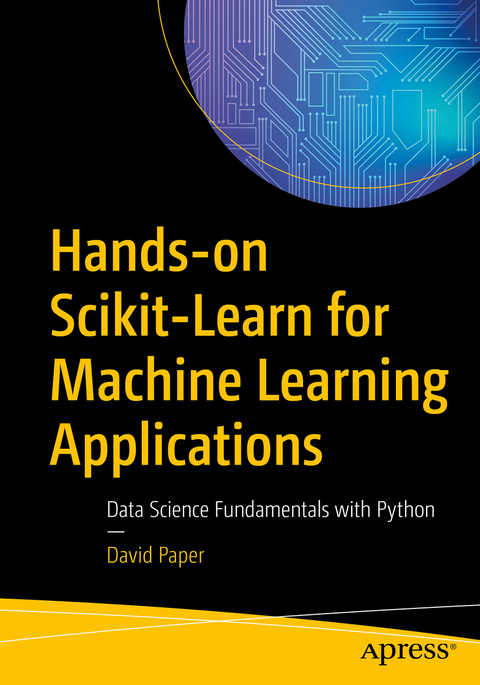
Hands-on Scikit-Learn for Machine Learning Applications
Apress (Verlag)
978-1-4842-5372-4 (ISBN)
All applied math and programming skills required to master the content are covered in this book. In-depth knowledge of object-oriented programming is not required as working and complete examples are provided and explained. Coding examples are in-depth and complex when necessary. They are also concise, accurate, and complete, and complement the machine learning concepts introduced. Working the examples helps to build the skills necessary to understand and apply complexmachine learning algorithms.
Hands-on Scikit-Learn for Machine Learning Applications is an excellent starting point for those pursuing a career in machine learning. Students of this book will learn the fundamentals that are a prerequisite to competency. Readers will be exposed to the Anaconda distribution of Python that is designed specifically for data science professionals, and will build skills in the popular Scikit-Learn library that underlies many machine learning applications in the world of Python.
What You'll Learn
Work with simple and complex datasets common to Scikit-Learn
Manipulate data into vectors and matrices for algorithmic processing
Become familiar with the Anaconda distribution used in data science
Apply machine learning with Classifiers, Regressors, and Dimensionality Reduction
Tune algorithms and find the best algorithms for each dataset
Load data from and save to CSV, JSON, Numpy, and Pandas formats
Who This Book Is For
The aspiring data scientist yearning to break into machine learning through mastering the underlying fundamentals that are sometimes skipped over in the rush to be productive. Some knowledge of object-oriented programming and very basic applied linear algebra will make learning easier, although anyone can benefit from this book.
Dr. David Paper is a professor at Utah State University in the Management Information Systems department. He wrote the book Web Programming for Business: PHP Object-Oriented Programming with Oracle and he has over 70 publications in refereed journals such as Organizational Research Methods, Communications of the ACM, Information & Management, Information Resource Management Journal, Communications of the AIS, Journal of Information Technology Case and Application Research, and Long Range Planning. He has also served on several editorial boards in various capacities, including associate editor. Besides growing up in family businesses, Dr. Paper has worked for Texas Instruments, DLS, Inc., and the Phoenix Small Business Administration. He has performed IS consulting work for IBM, AT&T, Octel, Utah Department of Transportation, and the Space Dynamics Laboratory. Dr. Paper's teaching and research interests include data science, process reengineering, object-oriented programming, electronic customer relationship management, change management, e-commerce, and enterprise integration.
1. Introduction to Scikit-Learn.- 2. Classification from Simple Training Sets.- 3. Classification from Complex Training Sets.- 4. Predictive Modeling through Regression.- 5. Scikit-Learn Classifier Tuning from Simple Training Sets.- 6. Scikit-Learn Classifier Tuning from Complex Training Sets.- 7. Scikit-Learn RegressionTuning.- 8. Putting it All Together.
| Erscheinungsdatum | 29.11.2019 |
|---|---|
| Zusatzinfo | 33 Illustrations, black and white; XIII, 242 p. 33 illus. |
| Verlagsort | Berkley |
| Sprache | englisch |
| Maße | 178 x 254 mm |
| Themenwelt | Mathematik / Informatik ► Informatik ► Datenbanken |
| Mathematik / Informatik ► Informatik ► Programmiersprachen / -werkzeuge | |
| Informatik ► Theorie / Studium ► Künstliche Intelligenz / Robotik | |
| Schlagworte | Algorithmic Processing • Anaconda Distribution • Classifiers • confusion matrix • Data Science • dimensionality reduction • machine learning • NumPy • Pandas Format • Python • Regressors • scikit-learn |
| ISBN-10 | 1-4842-5372-8 / 1484253728 |
| ISBN-13 | 978-1-4842-5372-4 / 9781484253724 |
| Zustand | Neuware |
| Haben Sie eine Frage zum Produkt? |
aus dem Bereich


